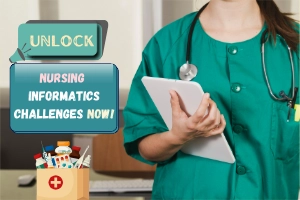The Dark Side of Electronic Health Records in Nursing
Published: 13 Jan 2025
Imagine a tool that transforms how nurses deliver care, making every second count. Ready to uncover the future of nursing? Keep reading!

What is EHR in Nursing?
Electronic Health Records (EHR) in nursing are digital versions of patients’ medical histories, including diagnoses, medications, treatment plans, and test results, all securely stored and accessible in real-time for healthcare professionals.
What’s the Difference Between EMR and EHR?
Here is the difference between EMR and EMR:

1. EMR (Electronic Medical Record):
- Healthcare providers use EMRs to store patient information, and these records are mainly for internal use within a specific organization or practice.
2. EHR (Electronic Health Record):
- EHRs are broader and more comprehensive. They enable healthcare providers to share patient information across different settings (hospitals, clinics, labs, specialists, etc.), giving a more complete view of a patient’s health.
Why Are EHRs Important in Nursing?
- Improved Patient Care: Access to real-time data allows for quicker and more accurate decisions.
- Enhanced Communication: Promotes seamless communication between healthcare teams.
- Increased Efficiency: Reduces time spent on paperwork, allowing more focus on patients.
- Error Reduction: Automated alerts help prevent medication and documentation errors.
- Better Patient Outcomes: Tracks patient progress for informed care decisions.
- Patient Safety: Provides critical information like allergies, ensuring safer care.
Types of EHR Systems in Nursing
Explore the different Electronic Health Record (EHR) systems commonly used in nursing and their unique features.

1. Epic Systems
- Widely used in large hospitals and healthcare systems.
- Offers comprehensive features like patient charting, medication tracking, and billing integration.
2. Cerner
- Popular in both small and large healthcare settings.
- Focuses on improving patient care and operational efficiency with tools for clinical documentation and data analytics.
3. Allscripts
- Known for flexibility and scalability.
- Provides integrated solutions for electronic prescriptions, patient records, and billing.
4. Meditech
- Common in smaller hospitals and rural clinics.
- Focuses on simplifying workflows, including patient scheduling, charting, and inventory management.
5. eClinicalWorks
- Often used by smaller practices and clinics.
- Features include telehealth integration, appointment scheduling, and patient portals.
Each of these systems is designed to streamline healthcare processes, improving patient care and nursing practices’ overall efficiency.
How EHRs Improve Patient Care
EHRs enhance patient care by:
- Providing real-time access to patient data: Nurses can quickly access updated patient information, enabling timely interventions and better decision-making.
- Reducing errors: EHRs minimize the chances of medication errors and miscommunications through automated alerts and reminders.
- Facilitating collaboration: Nurses can easily share patient data with other healthcare providers, ensuring coordinated care across the team.
- Improving documentation: EHRs streamline charting, saving nurses time and allowing for more accurate records.
- Supporting evidence-based practices: EHRs provide easy access to clinical guidelines and patient data, promoting best practices in patient care.
The Challenges of EHRs in Nursing
Nurses encounter several obstacles when adopting and using EHRs. These challenges affect both the quality of care and work efficiency.
1. Training Issues
- Nurses often struggle with inadequate training, making it difficult to use EHR systems effectively.
2. Technical Problems
- Software glitches or system failures can disrupt patient care, leading to frustration and delays.
3. Time Management
The time required for data entry can reduce the time nurses spend with patients, affecting care delivery.
4. Interoperability Issues
- Lack of compatibility between different EHR systems can create barriers to sharing important patient information.
5. Documentation Errors
- Incorrect data entry or retrieval can result in mistakes that may affect patient care.
By addressing these challenges, healthcare systems can improve EHR implementation, helping nurses provide better care.
Nursing and EHR Documentation
EHRs play a crucial role in nursing documentation by enabling accurate and timely recording of patient information. Nurses use EHRs to document assessments, medications, treatments, and patient progress, ensuring all details are accessible in real-time.

Benefits:
- Accuracy: EHRs reduce errors in documentation, improving the quality of patient records.
- Timeliness: Nurses can quickly update patient information, leading to faster decision-making.
- Accessibility: Authorized healthcare providers can access the documentation anywhere, ensuring continuity of care.
- Efficiency: EHRs streamline documentation, saving nurses time and improving overall workflow.
EHRs and Patient Privacy
- EHRs use encryption and secure access protocols to protect patient data.
- Only authorized healthcare providers can access patient records, ensuring confidentiality.
- Compliance with privacy laws like HIPAA is essential to prevent unauthorized disclosure.
- Healthcare facilities enforce strict policies and provide training to maintain patient data security and legal compliance.
Nursing Jobs Related to EHRs
Nurses can take on different roles focused on EHR management to improve patient care.
EHR Specialists:
- Manage and optimize EHR systems for accuracy and compliance. Average salary: $75,000–$95,000 per year.
Informatics Nurses:
- Work with technology to improve EHR systems and train staff. Average salary: $80,000–$100,000 per year.
Clinical Analysts:
- Assess and improve EHR workflows for better care. Average salary: $70,000–$90,000 per year.
Nursing Educators:
- Teach nursing staff and students how to use EHR systems effectively. Average salary: $70,000–$90,000 per year.
The Future of EHRs in Nursing
EHR technology is evolving, bringing positive changes to nurses and patient care.
- AI and Automation: EHRs will use AI to improve data management and reduce workload.
- Telemedicine Integration: EHRs will work with telemedicine for easier remote care.
- Better Data Sharing: Increased interoperability will improve communication across healthcare settings.
- User-Friendly Systems: Future EHR systems will be simpler to use, reducing burnout and improving satisfaction.
EHR-related roles in nursing will see steady growth, with competitive salaries and opportunities to make a significant impact on healthcare systems.
Conclusion
EHRs are essential in nursing, enhancing patient care and documentation. As technology evolves, it will continue to shape the future of nursing.
Explore EHR roles or stay updated to advance your nursing practice.
FAQs (Frequently Asked Questions)
Here are some common questions about EHRs and their impact on nursing.
EHR (Electronic Health Records) in nursing refers to digital records of patient health information, accessible to healthcare providers across various settings.
EHRs enhance patient care by providing accurate, real-time information, improving care coordination, reducing errors, and saving time.
Some common types of EHR systems in nursing include Epic, Cerner, and Allscripts, each with unique features tailored to healthcare settings.
Charting through EHRs ensures accurate documentation, which supports patient care decisions, reduces errors, and enhances communication between healthcare providers.
Nurses face challenges such as insufficient training, technical issues, time constraints, and adapting to new workflows when using EHR systems.
No, while both are electronic records, EMRs are for use within one practice, whereas EHRs can be shared across various healthcare providers for a comprehensive patient view.
Nurses use EHR systems for timely, accurate documentation, ensuring that patient records are up to date, and improving the quality of care and safety.
EHR-related nursing roles include EHR specialists, nursing informatics nurses, and clinical coordinators, all focused on managing and optimizing electronic records.
EHRs have led to more efficient workflows, reduced paperwork, and created opportunities for nursing roles focused on health informatics and data management.
EHRs ensure patient confidentiality through encryption, secure access, and adherence to privacy laws like HIPAA to safeguard health information.

- Be Respectful
- Stay Relevant
- Stay Positive
- True Feedback
- Encourage Discussion
- Avoid Spamming
- No Fake News
- Don't Copy-Paste
- No Personal Attacks

- Be Respectful
- Stay Relevant
- Stay Positive
- True Feedback
- Encourage Discussion
- Avoid Spamming
- No Fake News
- Don't Copy-Paste
- No Personal Attacks





